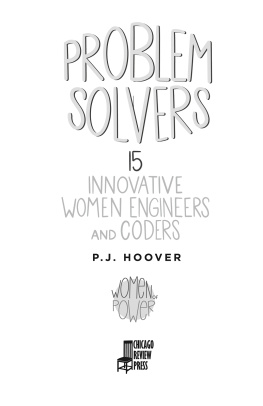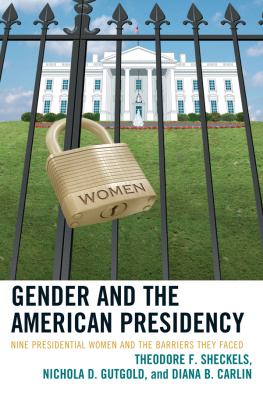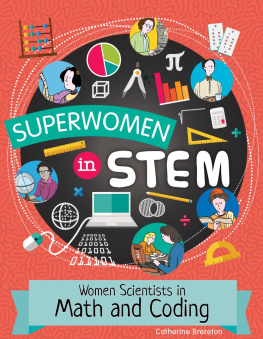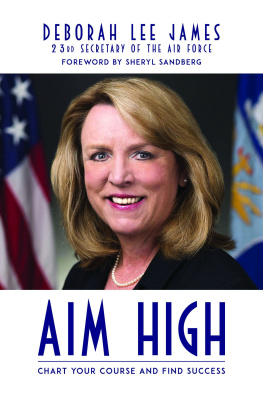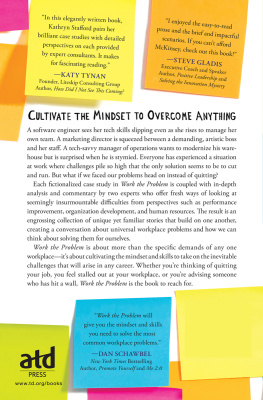All rights reserved.
Published by Chicago Review Press Incorporated
814 North Franklin Street
Chicago, Illinois 60610
Introduction
Hey there, and thank you for reading Problem Solvers: 15 Innovative Engineers and Coders! Ive had a ton of fun writing this book, and Im super excited to share it with you. But who am I and why am I qualified to write this book? Well, Im a writer. And an engineer. Turns out you can be both, though I never realized this when I was younger.
Growing up, the first thing I wanted to be was a Jedi. After all, who wouldnt want to be able to travel in space, use telekinesis, and do cool mind tricks? But seeing as how that wasnt going to happen (I triedtrust me), I spent my summers reading science fiction and fantasy books and teaching myself to program in BASIC on my Commodore 64. For those who dont know, thats a really old home computerone of the first and, in my opinion, definitely the most awesome. I always wanted the Atari system, but my dad didnt want me playing video games all day, even way back then. But dont worry, I still managed to play plenty of video games on the Commodore 64. Q*Bert, Jumpman, and Castle Wolfenstein were some of my favorites. I still manage to play quite a few video games these days, and Q*Bert remains one of my favorites.
As for my family, my dad was a pilot and an aeronautical engineer, and my mom was a secretary turned supermom who used power tools and built shelves and never let anything stand in the way of what she wanted to accomplish. In short, I had two pretty great role models, and I grew up loving math and science and building and creating.
What I didnt do when I was younger? Write books. I learned early on that books were things other people wrote, so I contented myself reading about worlds created by J. R. R. Tolkien, Roger Zelazny, David Eddings, and Isaac Asimov, to name a handful.
In school, I straddled the line of nerdiness and the popular crowd by spending my days as captain of the varsity cheerleading squad and my nights watching reruns of Star Trek and The Twilight Zone. I took computer science and astronomy in high school and snuck off to the Smithsonian National Air and Space Museum to watch IMAX movies every chance I got. I took profile tests to see what my perfect career path would be, and given my love of fixing things and my skills at math and programming, engineering seemed a great choice.
When it came to what kind of engineer I wanted to be, it was always an aerospace engineer. My dad was an aeronautical engineer, and I was fascinated by outer space and the idea of exploring strange new worlds (I blame it on Star Trek). But then, during my junior year in high school, the space shuttle Challenger blew up, killing all seven people on board. I remember watching the explosion while on a ski trip in Vermont. It was so cold that day that everyone was hanging out inside the lodge, and the news kept showing it happen, over and over again. It was horrific, and the tragedy had a pretty detrimental effect on the current aerospace market. I decided that possibly aerospace wasnt the best choice at that time. Instead, I headed off to a college called Virginia Tech where I enrolled in computer engineering.
Computer engineering as a degree was pretty new back then. Of engineering fields, it was the one least represented by females. I was one of four women in the entire class (which was only about forty kids). I took a combination of engineering and computer science courses. I wrote lines and lines of computer code. I wrote video games for my class projects (look for me on Scratch, at https://scratch.mit.edu/users/triciajh/. You can find my games there). And I loved every minute of it. Coding was like problem solving to the extreme. I loved trying new ideas, testing them, and then refining my programs to get them to work. And at the end of four years, I earned my bachelors degree in computer engineering.
Then, in a strange turn of events, I decided at the end of four years that I wanted to be an archaeologist (just like Lara Croft and Indiana Jones). I wanted to discover things like King Tuts tomb and hidden cities under the Roman Forum. Id seen the King Tut treasures the first time they came through America back in 1977, and Id loved ancient history ever since. So I stuck around Virginia Tech for an extra year and earned a bachelor of arts degree in history. Ancient history, specifically. I loved trying to unlock those mysteries of the past.
But then, once again, things changed, because I figured out engineering might provide better as a career path for the future. I applied to graduate school and continued on at Virginia Tech to get my masters degree in electrical engineering, specializing in digital design.
I graduated, moved from Virginia to Austin, Texas, and got a great job at Motorola designing computer chips. I worked on designs for video communications systems and memory controllers. I was able to live temporarily in Chicago for a year, working at Motorola headquarters. Then, after seven years at Motorola, I switched to Intel, where I continued designing computer chips. The chips I worked on when I was at Intel went into the earliest smartphones and e-book readers like the Kindle. It was exciting cutting-edge technology, and I was thrilled to be a part of it.
Engineering was great. I had friends at work. I enjoyed my job. It paid well. But after fifteen years as an electrical engineer designing computer chips I went through another turning point. Id just given birth to my second kid, and I wanted to try something different than engineering, but I wasnt sure what. First, I learned to solve the Rubiks Cube (you should learn to do the samepeople will think youre super smart; theres a video of me doing this on YouTube). Then I memorized a really long poem called Kubla Khan by Samuel Coleridge (impressive at parties; theres also a video of me doing this on YouTube). And then I got a crazy idea. I decided to write a book. (There is no video of me doing this on YouTube.)
But heres the thing: I was working full-time engineering, and I had two young kids at home (a newborn and a three-year-old). Where would I find the time to write a book? I was washing bottles and changing diapers, all while trying to get a promotion at work. Does it sound impossible? Does it sound like Id have no spare time whatsoever? That wasnt the case at all. I just had to reassess my life to find the time I needed.
I gave up television. All of a sudden, in the evenings after the kids bedtimes, I had a good two hours on my hands, and I used it faithfully each night to write my first story. Four pages at a time, and after three months, I had a completed first draft. Its amazing what you can accomplish if you chip away at it a little bit at a time. In case you are interested, my first book is called The Emerald Tablet, and its about kids with telepathic and telekinetic powersthe exact powers I wanted when I was younger! Its the first book of a trilogy about kids from continents hidden under the ocean called The Forgotten Worlds.
People tend to think of engineering and writing as totally different fields, but they have a lot in common. Getting through engineering school requires discipline and organization. Writing a book requires discipline and organization. Designing computer chips takes quite a bit of creativity. And yes, we all know writing a book takes creativity. Computer code is a lot like a book. You write. You test. You revise. You test some more, and you keep on revising until you get it right. Sure, you might find bugs, but no computer chip is perfect. Neither is any book.

